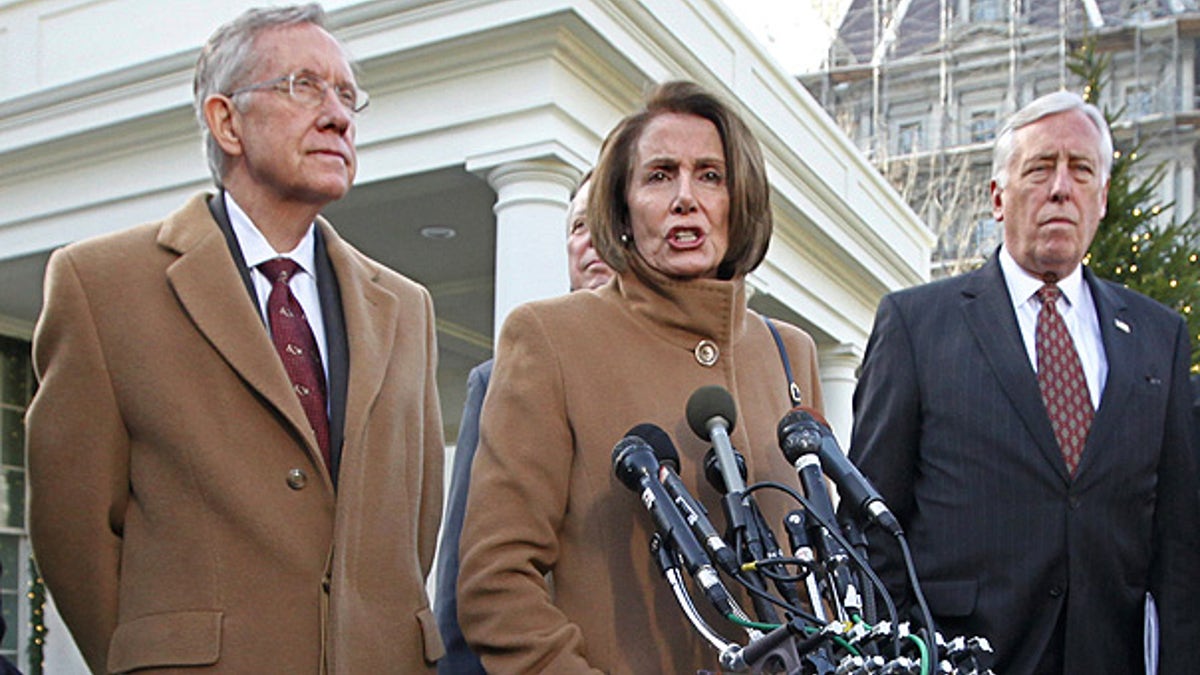
Dec. 9: House Speaker Nancy Pelosi is flanked by Senate Majority Leader Harry Reid, left, and House Majority Leader Steny Hoyer, outside the White House. (AP)
This is the third part of a five-part series on health care reform. Watch "Special Report With Bret Baier" every day this week at 6 p.m. ET for the latest installment in the Health Care Countdown series.
The Obama administration and congressional Democrats are claiming mission accomplished in their quest to strike a health care reform deal that doesn't add a "dime" to the deficit.
But critics say the House and the Senate are relying on massaged numbers and unrealistic projections that only achieve that goal on paper. If and when Congress carries out the overhaul, they say, the red ink could easily pile up.
"There's a number of things that make that highly implausible, dubious really," said Jim Capretta, a fellow at the Ethics and Public Policy Center.
The Congressional Budget Office is required to score what Congress says it will do without regard to whether lawmakers will actually achieve their goals. So when Democratic leaders told the CBO they'd raised hundreds of billions in revenue and cut $500 billion from Medicare over 10 years, the CBO said that course of action would reduce the deficit by more than $130 billion.
But the calculation assumes Congress will cover the uninsured by expanding Medicaid, increasing costs to cash-strapped states. And Congress double-counts savings in Medicare by saying changes would extend the life of the program but also spending the money elsewhere.
Douglas Holtz-Eakin, former director of the Congressional Budget Office, said Congress is trying to both extend the life of Medicare while using the savings for subsidies.
"You literally can't spend the same dollar twice -- it's a congressman's dream but that won't work," he said.
Congress also removed another expensive reform called the "doctor fix," which is a proposal to undo one of Congress' previous efforts to reduce Medicare spending. As it stands, doctors who treat the elderly would face a 21 percent cut in fees this year and steady cuts every year after that. Lawmakers agree that could reduce access to doctors for seniors, so they're determined to fix it - only not in the health care reform bill.
"The biggest hole in the financing is the fact that they've left out the doctor fix," Holtz-Eakin said.
"If you take that out, just that one on its own and take it out of the equation, the bill goes from being a small deficit reducer to being a large deficit increaser," Capretta said.
The doctor fix would push health care reform into the red because it would cost $210 billion. The Senate has not acted on the issue yet -- the House passed it separately but simply added the cost to the deficit which troubles Democratic centrists.
"I think eventually you're going to have to do something that is a bit longer term -- and the question is how will that be financed, or will it be financed and I think that's an open question," said Jim Kessler, vice president for policy with Third Way.
Fox News' Jim Angle contributed to this report.




